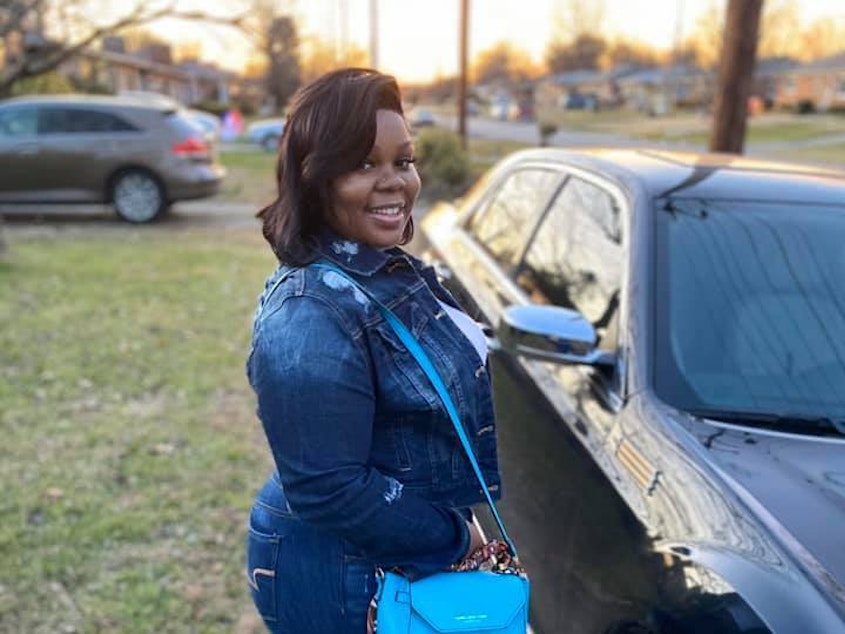Grand jury indicts an officer in Breonna Taylor case, but not for her death

A Kentucky grand jury on Wednesday indicted a single former police officer for shooting into neighboring apartments but did not move forward with charges against any officers for their role in Breonna Taylor’s death.
The jury announced that fired Officer Brett Hankison was charged with three counts of wanton endangerment in connection to the police raid of Taylor’s home on the night of March 13.
The grand jury did not announce charges against the other two officers involved.
Immediately after the announcement, people were expressing frustration that the grand jury did not do more.
“Justice has NOT been served,” tweeted Linda Sarsour of Until Freedom, a group that has pushed for charges in the case. “Rise UP. All across this country. Everywhere. Rise up for #BreonnaTaylor.”
Attorney Ben Crump, who is representing Taylor’s family, tweeted that the charges involved “NOTHING for the murder of Breonna Taylor. This is outrageous and offensive!”
Ahead of the grand jury decision, Louisville Mayor Greg Fischer announced a countywide curfew from 9 p.m. to 6:30 a.m. for 72 hours beginning Wednesday night. On Tuesday, the mayor declared a preemptive state of emergency as the city braces for possible protests.
The police department shut down parts of downtown Louisville to car traffic, saying they wanted to ensure the area is safe for demonstrators and those who otherwise live and work there.
The announcement comes six months after Taylor, a 26-year-old emergency medical technician, was killed in her home during a botched narcotics raid.
Officers entered Taylor's home after midnight, as she and her boyfriend, Kenneth Walker, were sleeping. Walker, thinking the police were intruders, fired a warning shot that struck one of the officers in the leg. Police returned fire, striking Taylor eight times.
Walker maintains police did not announce themselves before they barged into the apartment, which the officers dispute. He was initially charged with attempted murder of an officer, but the charge has since been dropped.
Taylor's name became a rallying cry over the summer at nationwide protests against racial injustice and police violence.
Demonstrators took to the streets to demand justice and accountability for Taylor and other Black victims of police brutality, including George Floyd, Rayshard Brooks and Jacob Blake.
Some of the protests in Louisville grew tense and violent. In June, a Black resident was shot and killed as police responded to curfew violations related to ongoing protests, prompting the firing of the police chief. In late August, 64 protesters were arrested after staging a sit-in on a highway overpass.
Protesters in Louisville marked their 100th consecutive night of action in early September.
Across the country, people also took to social media, petitions and even billboards to call for the officers' arrest as months passed with no official announcement.
The police department fired Hankison in June, saying he "displayed an extreme indifference to the value of human life" when he "wantonly and blindly" fired 10 rounds into Taylor's apartment.
The other officers, Jonathan Mattingly and Myles Cosgrove, were placed on administrative reassignment.
"Every day is still March the 13th," Taylor's mother, Tamika Palmer, said in August, five months to the day after the shooting.
Taylor's death and the ensuing protests have led to some policy changes in Louisville.
In June, the city council voted unanimously to ban no-knock warrants like the one police had obtained in order to enter Taylor's apartment. The legislation, called Breonna's Law, also requires police to wear body cameras when serving warrants and activate them five minutes before starting an operation.
The officers were not wearing body cameras during the fatal raid, though member station WFPL reports the city required all officers to wear and use them when serving warrants. The mayor has since ordered an outside firm to conduct a review of the Louisville Metro Police Department.
Last week, the city council passed a no-confidence vote against the mayor for his handling of Taylor's shooting and the unrest that followed. They offered him a list of proposed reforms but stopped short of calling for his resignation.
In a video responding to the vote, Fischer said several of the suggested police reforms are underway, but noted "the work needed goes beyond public safety."
And last Tuesday, the city of Louisville announced a $12 million settlement — the largest in its history — in a wrongful death lawsuit filed by Taylor's family.
The settlement includes a host of reforms to be adopted by the Metro Police. Those include establishing a housing and voucher program to encourage officers to live in lower-income city neighborhoods, and creating a clearer command structure when executing warrants at multiple locations, as was the case the night of Taylor's death.
Crump, a civil rights lawyer representing the family, described the settlement as only "partial justice."
"Regardless of this landmark step on the journey to justice, we still are demanding that Kentucky Attorney General Daniel Cameron bring charges immediately against the police officers that murdered Breonna Taylor," Crump said. "Immediately. This week. Justice delayed is justice denied."
Last week, Palmer, Taylor's mother, said it was time to move forward with the criminal charges, "because she deserves that and much more."
"Her beautiful spirit and personality is working through all of us on the ground, so please continue to say her name," she said, then did so herself: "Breonna Taylor."
